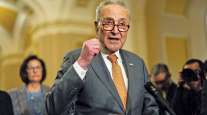Staff Reporter
FMCSA’s Martinez Touts Voluntary Safety Culture to Supplement Government’s Role

WASHINGTON — Regardless of how many drivers they oversee, trucking companies must helm a culture shift toward safety to reduce roadway fatalities, according to Federal Motor Carrier Safety Administration chief Ray Martinez.
Martinez, who was confirmed to his post Feb. 13, spoke at the Road to Zero Coalition meeting March 20. The Road to Zero Initiative, a partnership among FMCSA, the National Safety Council, the National Highway Traffic Safety Administration and the Federal Highway Administration, aims to eliminate traffic fatalities by 2050.
Martinez noted that trucking companies — both small family operations and large fleets — can foster a culture of safety because they want to, not just because FMCSA requires them to do so.
“It doesn’t always have to be the federal government mandating something or using punitive modes to get compliance,” Martinez told Transport Topics. “Voluntary safety prioritization by companies, large or small, is how you get there.”

FMCSA's Van Steenburg. (Eleanor Lamb/Transport Topics)
FMCSA Assistant Administrator Jack Van Steenburg said trucks and buses make up 5% of registered vehicles and are involved in 13% of traffic fatalities. In 2016, he said some 4,564 lives were lost in traffic fatalities. Some 762 of those were truck or bus occupants, while 3,802 were people in passenger vehicles, cyclists or pedestrians.
Martinez said that crashes involving trucks and cars more frequently claimed the lives of those in passenger vehicles, in part, because of trucks’ sheer size.
“I’m not saying that’s the fault of the motor carrier. That’s physics. There’s a higher degree of responsibility for those who drive trucks and buses,” Martinez said. “We have to continue to educate the public on how to share the road with those trucks and buses. We remember every single day that every fatality represents a lost life, a family that’s shattered and a community that mourns.”
Adherence to safety precautions — and the roles trucking companies and law enforcement play in encouraging those measures — was a major topic at the meeting.
Kansas Highway Patrol Capt. Christopher Turner, who also serves as president of the Commercial Vehicle Safety Alliance, stressed the need for inspectors to identify characteristics of driver behavior, including knowledge of rules of the road, impairment, fatigue and distraction. He noted that well over 90% of crashes can be attributed to driver behavior.
That is an A+ thing that all our stakeholders are here to drive down. It’s critical that we recognize that we support industry.
Kansas Highway Patrol Capt. Christopher Turner, president, Commercial Vehicle Safety Alliance
Turner also encouraged roadside inspectors to check drivers’ logbooks thoroughly and to evaluate all electronic logging device exemptions that may pertain to drivers. Over the past few months, FMCSA has granted exemptions to several groups, including the Truck Renting and Leasing Association and agriculture haulers.
“That is an A+ thing that all our stakeholders are here to drive down. It’s critical that we recognize that we support industry,” Turner said. “These safety measures are increasingly supportive of industry. Public education is one of the most important things we do.”
The Road to Zero meeting was held two days after a self-driving test car from Uber Technologies Inc. hit and killed a pedestrian in Tempe, Ariz., and the issue of autonomous mobility was discussed.
Skip Yeakel, a principal engineer for Volvo Group North America with 55 years of experience in trucking, said the evolution of automated technology will surely continue, but noted that he will probably not live to see fully autonomous trucks.
Martinez added that while autonomous technology seems to be an undeniable force in the future of vehicles, public education and outreach are important as companies are testing these technologies.
“I think there’s great promise there, but there’s no panaceas here,” Martinez said. “Technology is not going to be stopped.”
FMCSA will be represented at the Mid-America Trucking Show March 22-24. Martinez said he looks forward to attending and has made communicating with industry representatives one of his goals as agency chief. He said that trade association members are often engaged with the issues and invested in legislation.
“I hope to participate in association functions, not just to go and speak, but to listen. I want to reach to those folks to engage them,” Martinez said. “Safety is our priority, but it is not a monopoly. I think there’s a lot of great ideas out there.”





